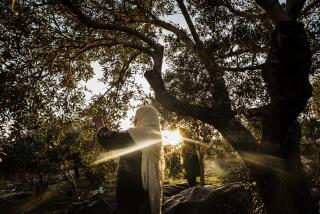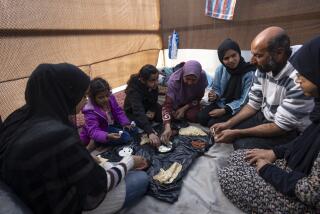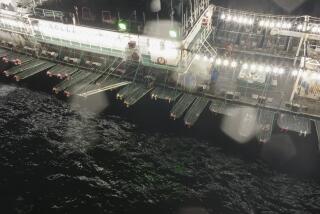Life on the edge trawling his beloved river
- Share via
CAIRO — The water is flat and the wooden boat slips past a shuttered villa toward the reeds. The fisherman crawls to the bow to check his nets; the boat drifts, but not to worry, he knows the Nile, its bends and banks, and the muddy shoals where the ferries dock and the day’s catch is hauled to market.
The nets are empty -- no surprise. The fish will come when the moon does, when the water is cool and dark and the din of the crowded city quiets. The nets splash, hidden again; he rows out to where the river widens.
Refat Farghaly has two wives and 13 children. His pale blue boat is battered, but paid for. His oars are hammered 2-by-4s, his nets are nylon and string, woven by his own hands. A toe on his left foot, punctured by a nail, is wrapped in plastic and rubber bands. He’s 47 and has been fishing since he was 4; his father taught him in Upper Egypt before moving the family to Cairo, where the markets paid better and the city floated like light upon water.
“Those buildings weren’t there in the 1960s,” he says, looking at the skyline in the morning glare. “Now we have clubs and restaurants on the shore. The river was not as dirty when I was a boy. There was not so much floating rubbish, and women washed their clothes on the banks, but today the government forbids that to try to keep the water clean.”
Dirty or clean, the Nile provides. Farghaly does not worry about the river these days as much as he does about inflation. The Egyptian economy is growing, foreign investment is strong, but no one seems to be getting ahead unless they’re politicians or already rich. Everywhere Farghaly goes he sees rising prices: the market where he sells his fish, the butcher shop where he buys his meat.
His life seems a net with big holes. He earns about $5 a day on the river. His son, also a fisherman, and his second wife, who sells fish in a nearby Giza neighborhood, together bring in $8 more a day. That’s better than many families, but Farghaly, a muscular man in a muslin shirt, can’t stay ahead, no matter how many fish he hauls in on the six-mile stretch of marshes and whispery currents he knows as intimately as each of his children.
The Nile flows around Farghaly’s home on Qorsaya island, just south of the tourist hotels and across the banks from a kitschy place called Pharaonic Village. With real estate prices rising and Cairo’s population doubling to 17 million over the last decade, the government plans to develop the island. It has sent bulldozers and troops; the 5,000 people who live there fear they’ll be evicted. Men in suits tell him not to panic, but Farghaly knows that men in suits are like fish, clever.
“I have the right to this island,” he says. “You let me build a house here. You let me raise my family here. How can you now push me out? Where will you send me? I am a fisherman. If you send me away from the water, I will die.”
Rage subsides on the river. It’s on land the troubles are, not the water; here a man with 13 children can drift alone with his nets, the morning sun on his face, and the wonder of the big fish beneath, like that time four years ago when he caught a bayad weighing 57 pounds. It took him and another fisherman to hoist it into the boat. He sold it for $72.
He rows past the ferry and the sound of the chain through the pulley, past island cows and dipping egrets, past the mosque and the villa of a long-dead king, and along a bank where just far enough away, but still close enough to remind you that the city’s rhythms are as strong as nature’s, traffic rattles through the trees. Footsteps, screeches, voices through open windows. Up there, where the cars and buses jostle on countless streets and knotted alleys, a child is born every 23 seconds.
If Farghaly netted fish at that rate, he’d be a rich man, a man with new shoes and a proper bandage. But he smiles the smile of many Egyptians, not at fortune, but for the ability to endure, to wake and face the day with near empty pockets and, somehow, praising God and relying on a bit of luck, make it through.
“I can go three or four days without catching a single fish,” he says. “It’s God who sends the fish. The key is to be smart and ready.”
The river runs high, and the fishing and tourist boats, the barges, the ferries and the grain ships crisscross Farghaly’s bow. He rows with his 2-by-4 oars, veins tightening on his forearms, his balding brown forehead not even sweating, his nets lying in wait, laced through reeds and stretched wide in deeper waters.
“If you ask me to choose between eating food or drinking from the Nile, I choose the Nile,” he says. “I can’t describe the value of the Nile. There are no words.”
He pauses for a moment, lifts his oars, figuring there must be words somewhere. There aren’t. He rows toward home to rest and wait for the night, when the fish run and, God willing, his nets will be full.
--
Noha El-Hennawy of The Times’ Cairo Bureau contributed to this report.
More to Read
Sign up for Essential California
The most important California stories and recommendations in your inbox every morning.
You may occasionally receive promotional content from the Los Angeles Times.














